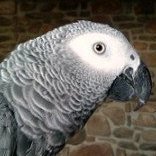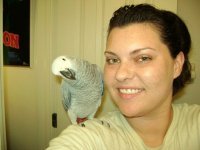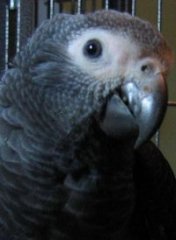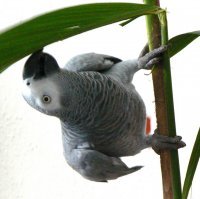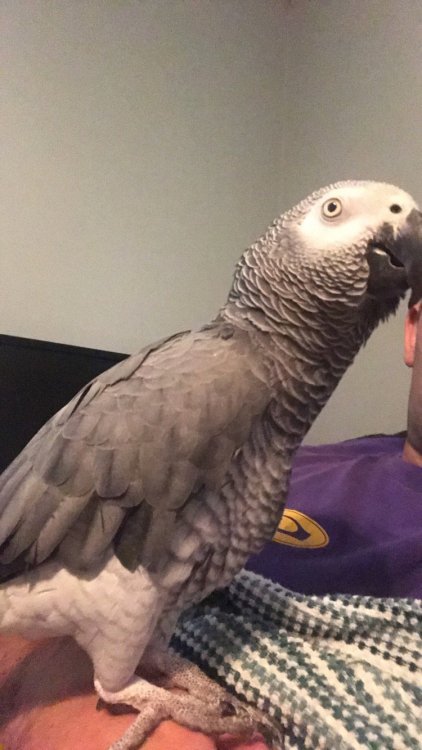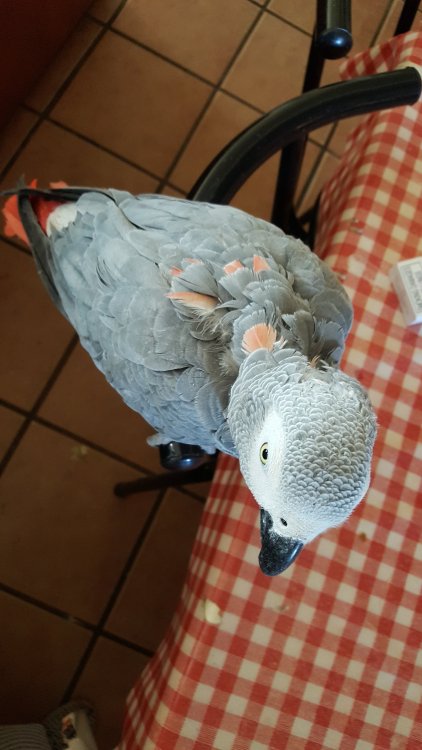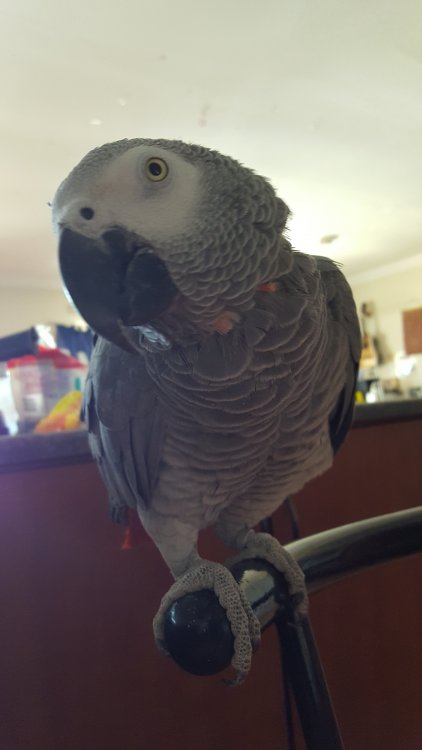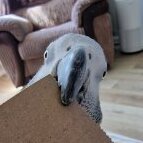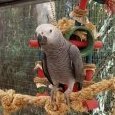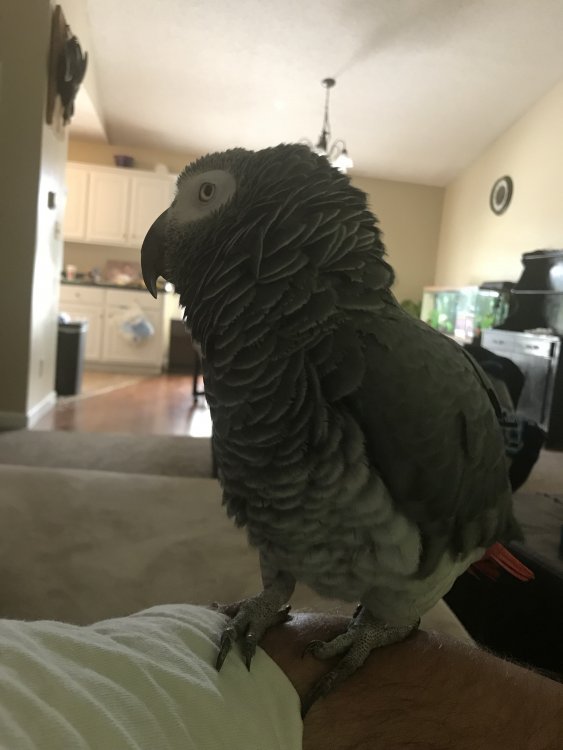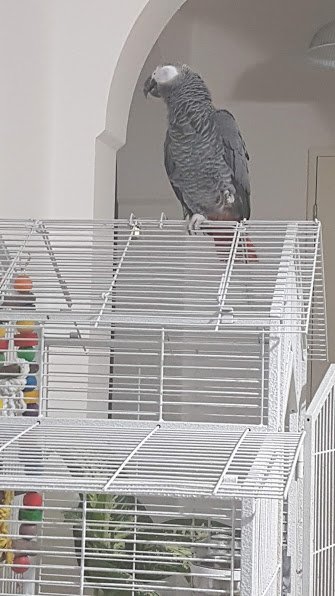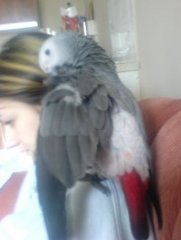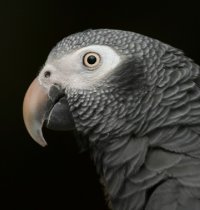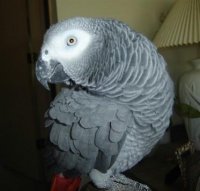NEW ADDRESS FOR MEMBERS GREYFORUMS.ORG
Leaderboard
Popular Content
Showing content with the highest reputation on 07/01/2018 in Posts
-
The access to this forum got very flaky a while back so I have been away. But It now it all seems to be hunky dory 🙂3 points
-
Welcome Rudygrey. Very nice looking Cag. Welcome to the Grey Family. Rudy looks very calm and relaxed. Looking forward to watching the two of you grow together.3 points
-
Yeah I feel like she’s happy I just got her late last night and she already sings to me 😄3 points
-
2 points
-
Welcome and thank you for the post and pictures. Your sweet bird is called a Red-factor Grey. This occurs naturally (genetically) and sometimes as they fall out, the replacement feathers will be grey. In extremely rare cases, it can be because of a medical condition. May I suggest, realizing that some of the foods mentioned are your Fid's favorites, it is advised that you should only feed 100% whole grain bread a couple times a week. Fruit, again very little should be fed to a Grey...it's mostly sugar with no nutritional value, 2-3 times a week which is great. White potatoes should be substituted with sweet potatoes. I am sure you know that they never can eat the "eyes" of a white potato. Eggs, 2-3 times a week is great. Suggestion, wash the egg before hard-boiling to reduce any chance of salmonella. Cut the egg in half, in the shell and serve the shell and all to your fid. You can even take the shell, after it is cooked and bake at 350 degrees and crumble over other fresh food. Hard pasta such as spaghetti (uncooked) is good substitute for bread. Have you ever made birdie bread? Get a cornmeal muffin mix similar to Jiffy, add baby food jars, (I use two), three eggs, with cooked and smashed shells, and go crazy with your choices of bird seeds, frozen mixed veggies, etc. Use your imagination...and bake to instructions. As a final thought, the food chain for a parrot is most to least, green leafy veggies, orange veggies, a safflower seed mix (staple), fruit, and bread. It's not the small amount of salt or sugar that can kill a parrot, it is the accumulation of such that will affect them in the long run. Finally, a couple times of week, boiled chicken bones (Legs) with a little meat on them, no or low-sodium tuna, and our favorite, a 1/2 tsp. of low/no-sodium peanut butter to start the day...(an excellent seed mix to leave in the cage 24/7 is Volkman's Large Hookbill Safflower Mix, no sunflower seeds. Two excellent on-line sources are Chewy.com and Amazon)2 points
-
My beautiful Chjango (Big Boy) has pink feathers on his back and his chest. When he grooms himself sometimes they are pulled out and grow back with others sprouting. It started with one feather. Now he must have about 20. He is a healthy male and is 10 years old. Loving and very vocal, especially when it comes to food he will let rip with "Where's my tos (toast) apple, orange, egg egg egg, air (pear)." His favourite food is toast, mashed potato and egg, either boiled or scrambled. He is also an avid consumer of any fruit. I have attached a photo. D2 points
-
Ruby is a beauty! Hello and welcome to the forum. As to keeping her happy, my grey is happiest when he has my full attention.2 points
-
Once they lose the dark baby eyes and they become the mature ones like she has its hard to determine age but its a good guess, she is lovely. You can keep her happy by taking care of her every whim, give her a good diet, a big cage with lots of toys and loads of time out of cage to spend with you and your family. You can find lots of threads here in various rooms on what to feed and not feed, ideas for toys that may be from common things in your house because you don't have to spend a fortune to entertain a grey, sometimes a simple box will keep them busy for a while. Looking forward to hearing and seeing a lot more from Ruby.2 points
-
I'm afraid we are not trained vets so will not be able to offer much advice about what's going on here. If it were my bird in that situation then I would visit an avian vet for a checkup. Changes in behaviour like that could potentially indicate a problem.2 points
-
Very tearful. May God be with you always. May all the beautiful feathered angels you have nurtured here be there to help guide you home when it is your time.2 points
-
Hello, I have my African grey boy for 4,5 months now, he's almost 2 years old and had only one owner previously. He has amazing personality and such a fast learner, he learned already so many new words and sounds from me. He's very comfortable with me and constantly staying on his one leg, and has the belly shiver when I even talk to him ( the sign that he's actually happy). He doesn't have any problem to take food from my hands and even from my lips and he gives me lots of kisses, he's not scared to be very close to my face and even touches my hair with his beak, but at the same time in no way he will step up on my hand ( but he was stepping up on the previous owner). As soon as I'll put my hand next to him in the position to step up he becomes very scared and sometimes even starts to shiver or he's trying to "fly away". He can't fly at all as when I got him the previous owner clipped his wing terribly ( the vet did ), only 1 wing was clipped which is totally wrong and was literally until the "meat" ( so he had no feathers there at all, and he was falling so many times that I constantly had blankets on the floor so in case he falls he won't hurt himself. Still at the beginning he even had a bit of blood there which was extremely upsetting. Hopefully the wings grew a bit back after quite a long time even if he still can't fly. I've never done anything bad to him to be so scared of my hands for the stepping up, so I really don't understand his reaction. I can see he loves me and he's constantly looking for contact with me but at the same time he doesn't let me touch him completely. He doesn't live in his cage. I mean, I put the training stand right next to his cage with an open door so he can get out any time and goes from the cage's door to the stand and he's always free, he also sleeps on the stand or inside his cage whenever he wants ( I don't cover him at night, I just turn the light when he's ready to sleep). I'm extremely patient with him as I do love him a lot but I'm getting a bit desperate with what to do and how to make him step up and what am I doing wrong? Any of your advice will be much appreciate it and I really hope someone can help me with it. Thanks a lot in advance!!1 point
-
Well Ajax went to the vet yesturday. He was NOT happy, he growled at her the whole time, but he did well. She mentioned 2 things that concerned her. 1. He was a little overwieght, but she said that was expected since he hasn't been out of his cage to get any exercise, 2. He has a few pink feathers on his belly. The owners said that he has had these feathers since he was a baby. I know I should have asked her but has anyone ever dealt with this? What kind of a problem could this be? Kerri1 point
-
Kittykittykitty, Talon, Judy, luvparrorts, Ray, Greywings , Greyness, Timbersmom, and all the rest of you beautiful people, I truly have loved and prayed for all of you. I'm tired, I have no more fight. Val, bless you. Rev Jayd My Way Frank Sinatra And now, the end is near And so I face the final curtain My friend, I'll say it clear I'll state my case, of which I'm certain I've lived a life that's full I've traveled each and every highway But more, much more than this I did it my way Regrets, I've had a few But then again, too few to mention1 point
-
That’s good our ruby is great she loves dancing and whistles a lot and talks a little, I think we’ve given her a much much better home than she had and she is a happy girl now1 point
-
Their personality will take months to come out. We thought we knew our Huey but he keeps surprising us with things his old owner told us he did and is just now starting to do for us over 6 months later.1 point
-
1 point
-
Its possible he has developed a hand phobia, some birds just do not like hands so offer an arm for him to step up on and see if the reaction is the same. I don't usually wear nail polish so if on occasion I do wear some my grey doesn't like it at all, she thinks its something out to kill her. Its good you are very patient with him and it can take longer than 4.5 months for him to fully trust you as grey time is slow time. As for the wing trim, how can someone think that clipping only one side is a proper trim, the way you describe your bird was butchered plain and simple and that person should never touch your bird or any bird again, I'd be mad as hell if it happened to my bird, that person would be "butchered" if you get my drift.1 point
-
Also she had her wings clipped when I got he but if I let them grow can she learn to fly in a controlled environment? Or will they not fully grow back1 point
-
Ruby seems to not like being petted she doesn’t mind you holding her but doesn’t want to be petted she also bites a lot not hard but I was wondering how can I discourage the biting and screeching?1 point
-
Yesterday my African Grey, Frankie a female of 19 years, stopped eating at sleeptime. Today she only drank some water. She just regurgitated it. She did the same about two weeks (13th of June) shortly before laying an egg. I took her to the vet then, he told me she has diarhea after he examined her poop. Since then her poop is brown not green despite finishing the medication the doctor gave her. Now she is back to sleeping. It is is not her first egg ( going on for 10 years at least she lays on and off every 6 months ). I have been feeding her calcium foods and adding supplements to her food and water since the last egg. I am afraid I am encouraging egg laying somehow. Where I live, Kuwait, there is only one avian vet the one she had seen lately. He did not even suspect the egg presence. Now I am waiting for her to lay her egg. I have another bird I think it is a male, I kept them apart since her last egg (13th of June). I am not sure how to act in front of this regurgitation, I have only seen her do that these two times. She regurgitated just water this time, last time there was food. I just presented her with water she took it 3 times. I put a water boiler next to her cage and I covered the side of the cage since I read steam helps her relaw her botox muscles to release the egg. She just popped water since she is not eating. And she regurgitated her water again.1 point
-
Usually when they regurgitate food as a sign of affection they don't usually bring up only water and if she is not eating then its time to see an avian vet. The one you mention does not sound like they are very reliable so see if you can find a reputable one even if you have to travel some to get there. Her not eating is not a good sign so please get her some help asap and let us know what you find out.1 point
-
Hello everybody. Nice to find so many people in the forum! I am new Grey owner; I got my new friend just two days ago. He is around one year old and his name is Riko. Previously a kid used to have him, but now he moved abroad to study and the parents couldn't keep him, so they had to sell him. I must admit, I am bit surprised with that bird. I think I was more scared than him when I first brought him at home. Ι was hesitant to bring him out of the cage, not to mention to feed him. But straight away, he took seed from my fingers. I opened the door, he came out and sit on top of the cage. Today I noticed when I approach him to the cage, we comes close to me and makes some weird sounds like puffing and blowing, opens his wings, moves his head up donw and he pretensed he bites my fingers, but although my finger goes in his mouth almost completely, he does not apply pressure at all. Also I noticed that during these weird moves, sometimes he is regurgitating some seeds. Is all this normal to be so easy going straight from the beginning? Could you explain this weird behaviour when I go close to the cage - is it normal or should I get worried? I forgot to mention that I keep him in the same big cage he used to be before. I am planning to go to the vet tomorrow maybe for a basic check up cause the kid didnt give me any info about his health - any advice what to check? I attach a picture of him. It seems he is sleeping on the cage, though he is talking like hell (while sleeping?) :-) Thank you all in advance. Glad to join the group!1 point
-
1 point
-
Welcome to the forums! I love baby grey photos! Look at that cute little ball of fluff! Do feel free to ask any questions- we have lots of members who will be happy to help and advise!1 point
-
Welcome Alex and Riko! There is a wealth of information already available in these forums, so please do take a look around. If you do have any questions then go ahead and ask, there are a lot of people here who will be able to help and advise.1 point
-
1 point
-
Welcome to the Grey Family, Lil! What is your Cag's name? Can't wait to learn more about the both of you. Like, where do you live?1 point
-
This is my first gray and I don’t have any other birds. I did have an Electus but my daughter has it now when I moved to Florida.1 point
-
Hello Alex and welcome to our family. It appears he is in love with you, he is showing his desire to mate with you and that should be discouraged as it will only frustrate him, when he gets like that ignore him for a few minutes and do not touch him beyond the head.1 point
-
Hello Lil and welcome to our family. Try to read thru as many of the threads here for lots of helpful advise. If you have specific questions do not hesitate to ask. Do you have any other birds? Is this your first grey?1 point
-
1 point
-
Congratulations on your new baby! And may I be one of the first to welcome you to Grey Forums! The behavior you have described is actually a loving gesture of his wanting to share his food with you. Sounds like he's warming up quickly to you, which is great! I'm not sure what your plans are with his cage, but my recommendation is that when you're able, to get him something bigger. Greys love space to play, flap their wings, swing, etc. etc. This particular cage is actually intended for much smaller birds. Again, welcome to the forum, and keep on posting!1 point
-
It makes me so sad to see this. Just know you are loved and appreciated, and your contributions are a legacy here. God bless you and Maggie.1 point
-
I thought I would post information I have gleaned over the years on wild greys and their social events with the group flock, family flock and as they age from baby to adult. It will help you in understanding why your grey starts changing as it ages, why it contact calls, why it becomes aggressive over "It's" cage (think tree hole) and lastly, why they are so nervously alert to any change. Behavior Wild African grey parrots are very shy and rarely allow humans to approach them. They are highly social and nest in large groups, although family groups occupy their own nesting tree. They are often observed roosting in large, noisy flocks calling loudly during mornings and evenings and in flight. These flocks are composed of only African grey parrots, unlike other parrots that are often found in mixed flocks. During the day, they break into smaller flocks and fly long distances to forage. They often roost in trees over water and are said to prefer roosting on islands in rivers. Young birds stay with their family groups for a long period of time, up to several years. They socialize with others of their age in nursery trees, but remain in their family group within the larger flock. Young African grey parrots are cared for by older birds until they are educated enough and old enough to become independent flock members. Young exhibit appeasement behaviors towards older members. As they mature, birds become more aggressive with conspecifics. African grey parrots in the wild must learn a complex set of skills. They need to learn how to separate desirable food plants from toxic plants, how to defend territory, how to recognize and avoid predators, how to find safe water, and how to rejoin their families when separated. Also, they must learn how to develop role-appropriate behaviors such as competing and defending nest sites and raising offspring. Competition for nest holes during mating season makes the species extremely aggressive. Because African grey parrots are partial ground feeders, there is a series of behavioral events that occur before landing and safe consumption takes place. Groups of parrots gather at a barren tree until it is completely filled with hundreds of birds that partake in preening, climbing, vocalizing, and socializing. Eventually the birds make their way down to the ground in waves with the entire group never being on the ground at the same time. Once on the ground, they are extremely vigilant, reacting to any movement and/or sound. Communicating Wild African grey parrot flocks follow a daily pattern of vocalizations. Usually the flock is quiet from sunset until the next dawn. At day break, the flock begins to vocalize before setting out to forage at different locations throughout the day. At dusk, upon return to the roosting site, there is a period of vocalization. There are a variety of different types of calls and vocalizations, including alarm calls, contact calls, food begging calls, and agonistic calls. Contact calls are of particular importance because they serve to identify where other members of the flock are and help promote flock cohesion. Alarm calls indicate varying levels of distress, these calls are particularly loud and of a frequency that carries well in order to warn fellow flock members. Young learn these vocalizations from parents and flock mates, so pet parrots will not learn appropriate wild vocalizations, but will show similar patterns and use of calls. It has been found that African grey parrots demonstrated complex cognitive competence in understanding both the similarities and dissimilarities among musical note frequencies and were able to master the musical code. It was determined that African grey parrots must isolate a sound from background noise, imitate it, categorize the acoustic stimulus, encode it into long term memory, and monitor the output sound to match it with the internal template, which is what we call calibrating.1 point
-
Well that is just damn sucky, i will leave you some good karma to make up for it i got two karma's woop i hope i dont get bad karma, those damn bad karma rascals:P1 point
-
i doubt your grey has the disease, especially since they were there from birth, it definately just sounds like redfactor, my grey has red factor too, they may be replaced with grey feathers after her first moult or return1 point
-
Sorry no pics yet!!!! I am hoping to take some this weekend and I will post on Monday!1 point
-
And they strike again (the negative karma police, that is)! I'd say someone doesn't like me very much. At least I've given them a new hobby :silly:. Back to PBFD, does anybody remember the user name of the person who said their grey was diagnosed with it? I think they also had a second grey that had polyoma, and a cockatoo. I'm curious about how her birds are doing now. I hope that the cockatoo didn't come down with anything .<br><br>Post edited by: spookyhurst, at: 2007/12/13 05:461 point
-
1 point
-
1 point
-
spookyhurst im angry that someone took karma from you, your post was informative & posted in good faith,it annoys me that members remove karma, i think they should at least have the courage to send a PM & explain why they did it.Karma right back at you1 point
-
Yeah, I never knew about PBFD till I read the stuff you posted...very informative. I will only take Karma in rare cases when info posted is moronic or dangerous...so I'm giving you some Karma for sharing something that we should all know about.1 point
-
I'm sorry that someone felt compelled to take away your karma, Spookyhurst, I would rather they send you a pm explaining why they thought you deserved it. Your post was the first time I have heard about the pink feathers being a sign of illness but that does not mean that it is not true, thanks for posting it for us to read about. Yes it was depressing to read but if there is any truth to it then forewarned is forearmed.1 point
-
I too wouldn't worry either since he seems happy and talks, I am going for the red factor as the case. Kerri why don't you post a picture showing us the pink feathers and we all can have a look at what you are talking about. It could be that since it is just a few scattered feathers they look pinkish instead of red.1 point
-
Thanks for all of the information, I think he is fine since he seems quite happy and talks alot.1 point
-
Well Kerri, I wouldn't be too worried about it unless you don't see the dusty beak and your grey acts depressed. My money is still on Red factor.1 point
-
Hi Kerri, as judygram & BMustee have said the red feathers indicates the red factor in a grey.My newest addition has red feathers on his legs, Here is a link about colour mutations http://www.greyforums.net/forums/african-grey/35360-color-mutations.html#383841 point
-
Yes she is an avian vet, and she seemed very informed for other areas, training, food etc... She even gave me advice on Keno my B & G. Maybe I am dwelling on that comment too much because she mentioned it once but never discussed it with me. It's so cute though he has alot of pink feathers! Thanks for your replies! Kerri1 point
-
Pink feathers would indicate the red factor in greys, and that is special. There is nothing wrong with them, it just means that he has the pigmentation in some of his feathers that makes them red or pink as you call it. Some people would love for their greys to have that coloring and we have a few here on the forum that have greys with that red factor in them. You have a special grey, Kerri. He definitely needs some exercise to burn off that fat he has put on and you need to work on that but enjoy the red or pink feathers.1 point
-
It's Red Factor...nothing to worry about. Is your vet an Avian vet? My grey has a feather on the back of his neck with a pink dot on it, I think it's so cute.1 point

